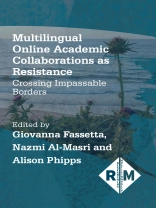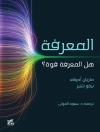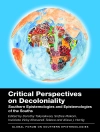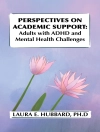This book details online academic collaborations between universities in Europe, the USA and Palestine. The chapters recount the challenges and successes of online collaborations which promote academic connections and conversations with the Gaza Strip, despite a continuing blockade imposed on Gaza since 2007, and forge relationships between individuals, institutions and cultures. The chapters examine, from different perspectives, what happens when languages and the internet facilitate encounters, and the fundamental importance this has as a form of defiance and of resistance to the physical confinement experienced by Palestinian academics, students and the general population of Gaza. They highlight the limitations of multilingual and intercultural encounters when they are deprived of the sensory proximity of face-to-face situations and what is lost in the translation of languages, practices and experiences from the ‘real’ to the ‘virtual’ world.
This book is open access under a CC BY NC ND licence.
Inhaltsverzeichnis
Prologue: Collaborating Under Siege: A Whatsapp Tale
Introduction: Alison Phipps, Giovanna Fassetta And Nazmi Al Masri: Can You ‘Here’ Me? Editors’ Reflections on Online Collaborations Between the Gaza Strip and the Global North
Part 1. English as an Additional Language and Online Technologies
Chapter 1. Bill Guariento: Engineers Operating Multilingually: Reflections on Four Years of Glasgow-Gaza Pre-Sessional English Telecollaboration
Chapter 2. Sanaa Abou-Dagga: Islamic University of Gaza (IUG) Internationalization Endeavours at the Level of Postgraduate Programmes
Chapter 3. Gary Motteram, Nazmi Al-Masri, Heba Hamouda, and Shaiffadzillah Omarali: Exploring Mobile Support for English Language Teachers in a Context of Conflict: Syrian Refugee Teachers in Jordan
Part 2. Finding Motivation for Language Learning in a Situation of Forced Immobility
Chapter 4. Abedrabu Abu Alyan: Motivational Strategies and Online Technologies: Are Palestinian EFL University Students in the Gaza Strip Empowered to be Bilingual?
Chapter 5. Anna Rolinska, Bill Guariento, Ghadeer Abo Uda and Ongkarn Nakprada: ‘Really Talking’ to Gaza: From Active to Transformative Learning in Distributed Environments and Under Highly Pressured Conditions
Part 3. Palestine and the Arabic Language
Chapter 6. Giovanna Fassetta, Nazmi Al-Masri, Mariam Attia And Alison Phipps: Gaza Teaches Arabic Online: Opportunities, Challenges and Ways Forward
Chapter 7. Maria Grazia Imperiale: (In)Articulability of Pain and Trauma: Idioms of Distress in the Gaza Strip
Part 4. Making Connections
Chapter 8. Ahmed S. Muhaisen: The Experience of The Islamic University of Gaza in Cross-Border Academic Collaboration: T-MEDA Project as a Case Study
Chapter 9. Chantelle Warner and David Gramling: From the Kitchen to Gaza: Networked Places and the Collaborative Imagination
Afterword: Alison Phipps: “I Am Here”: Savouring the ‘Selfie Moments’
List of Contributors (in Alphabetical Order)
Über den Autor
Nazmi Al-Masri is an Associate Professor of English Language Teaching at the Islamic University of Gaza. He is an Honorary Fellow in the School of Education at the University of Glasgow, UK until 2029. He has served as a Principal Investigator and Co-Investigator for various international research projects, including Disabled Voices from Gaza, Disability under Siege, Culture for Sustainable & Inclusive Peace (CUSP), Researching Multilingually at the Borders of Language: The Body, Law & the State, Welcoming Languages, and e Training Fin Pal.












